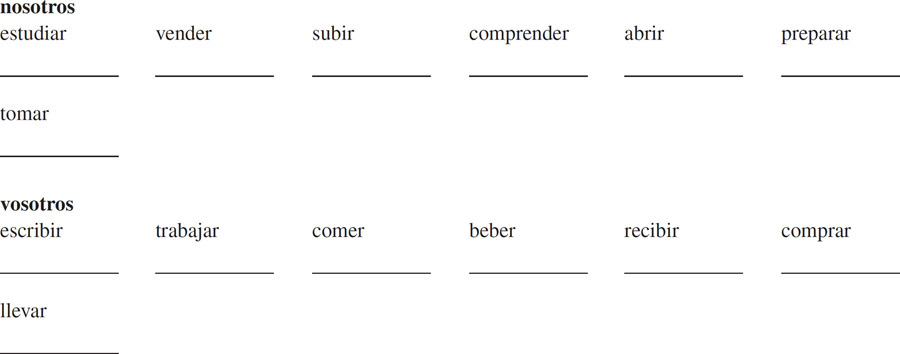
The imperfect is formed by adding the appropriate endings to the stem.

All forms of the imperfect of -er and -ir verbs must have a written accent. Because first- and third-person singular forms are identical, context determines the subject for them.
Note: The imperfect has three clearly separate meanings in English:
1. It describes the way things were, and the things people did, during a specific period of time in the past:
I (always) ate lunch at school.
I would (always) eat lunch at school. Yo comía en la escuela.
I used to (always) eat lunch at school.
I (always) ate lunch at school.
2. It sets the scene for a narration in the past:
It was a dark night. Era una noche oscura.
It was raining. Llovía.
We were lost. Estábamos perdidos.
3. It depicts action that was in progress in the past:
We were walking home. Caminábamos a casa.
My friend was talking. Mi amigo hablaba.
I was thinking about my dad. Estaba pensando en mi papá.
Write the form of the imperfect that corresponds to the subject indicated:


A. Write the imperfect form in the person indicated by the subject:
1. él (hablar) _________________________
2. Elena y yo (vivir) _________________________
3. ella (saber) _________________________
4. Uds. (conocer) _________________________
5. los niños (pedir) _________________________
6. nosotros (correr) _________________________
7. tú (partir) _________________________
8. yo (pasar) _________________________
9. vosotros (esperar) _________________________
10. Uds. (acabar) _________________________
11. Ud. (caminar) _________________________
12. él (comprender) _________________________
13. Juan y Pedro (tomar) _________________________
14. yo (escribir) _________________________
15. Ud. (amar) _________________________
16. vosotros (conocer) _________________________
17. tú (beber) _________________________
18. nosotros (comprar) _________________________
19. ellos (subir) _________________________
20. yo (correr) _________________________
21. ella (responder) _________________________
22. tú (guardar) _________________________
23. Ud. (aprender) _________________________
24. Juan y él (llevar) _________________________
25. vosotros (pasar) _________________________
B. Change to imperfect and translate the new form into one of its meanings in English:
1. contestamos _________________________
2. vendes _________________________
3. él pregunta _________________________
4. aprendo _________________________
5. ellos escuchan _________________________
6. Ud. escribe _________________________
7. ellos aprenden _________________________
8. Ud. estudia _________________________
9. vivimos _________________________
10. él teme _________________________
11. él abre _________________________
12. ellos enseñan _________________________
13. él asiste _________________________
14. tomamos _________________________
15. leo _________________________
16. Uds. beben _________________________
17. temo _________________________
18. ellos reciben _________________________
19. necesito _________________________
20. Uds. viven _________________________
21. abrimos _________________________
22. contestáis _________________________
23. tomas _________________________
24. él bebe _________________________
25. abrís _________________________
Write the Spanish that corresponds to the English verb forms, selecting the correct verb from the list on page 6.
1. they used to live _________________________
2. we were working _________________________
3. you (s., fam.) were not selling _________________________
4. we used to live _________________________
5. they did not need _________________________
6. you (s., for.) were learning _________________________
7. he used to believe _________________________
8. you (pl., fam.) were asking _________________________
9. I used to fear _________________________
10. did you (s., fam.) understand? _________________________
11. she was teaching _________________________
12. you (pl., for.) used to take _________________________
13. we were not listening _________________________
14. he used to sell _________________________
15. you (pl., for.) were opening _________________________
16. did they always receive …? _________________________
17. we were attending _________________________
18. you (s., fam.) used to study _________________________
19. he was reading _________________________
20. they were living _________________________
21. you (pl., for.) were not hiding _________________________
22. I used to receive _________________________
23. they did not understand _________________________
24. I was eating _________________________
25. you (s., for.) used to sell _________________________
26. you (s., fam.) were not taking _________________________
27. they were listening _________________________
28. was he attending? _________________________
29. you (pl., fam.) used to need _________________________
30. she was answering _________________________